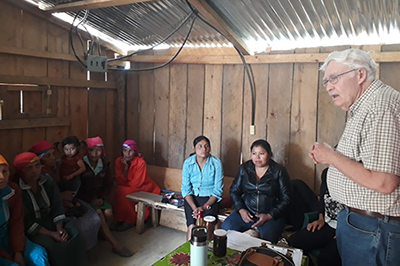
In Honduras, horticulture production provides farmers with economic opportunities and a path to success. However, according to the U.S. Agency for International Development (USAID)-funded Feed the Future program in Honduras, low capacity in food processing and innovation persist. Many crops are sold with minimal value added. In response, local programs have engaged female entrepreneurs and encouraged them to work together to add value to these crops by producing jams, marmalades, sweets, and pickled vegetables.
The Asociación de Mujeres Intibucanas Renovadas (AMIR) is a women’s organization with over 650 members. Founded in 1980, AMIR works to advocate for indigenous women’s rights in Intibucá, Honduras. Since its establishment, AMIR has received support from various organizations to improve the livelihoods of its members and their families. AMIR actively works to promote literacy, gender equity awareness and prevention of domestic violence against women.
Since 1997, AMIR has worked to ensure both an income for its members and its own sustainability. AMIR members do not own large plots of land. Instead, they use their backyards as home gardens to produce vegetables and fruits trees. These crops are used for household consumption and sale at local markets or farms, creating an alternative source of income for women and economically empowering indigenous women. A food processing plant built by AMIR enabled women to become suppliers and earn an additional income at a preferential price. Revenue from sales are now used to provide social programs for AMIR members, such as scholarships for members’ children and trainings. Currently, agricultural yields are processed into fruits jams, liquors, pickled vegetables, and sweets.
AMIR has faced barriers to selling its products in formal markets, so it created a subsidiary company called Siguatas Lencas, which means “young girl” in its members’ indigenous language. The purpose of this new entity was to legally market AMIR’s products. However, a clear separation of roles and responsibilities between the two entities has proven difficult to define.
NCBA CLUSA, through its USAID-funded Farmer-to-Farmer program, was able to connect volunteer James “Jim” Graham with AMIR last year. James is an experienced international development professional. He spent three weeks in Honduras assessing AMIR’s organizational development needs to identify innovations that could facilitate entrepreneurial activities, ensure the sustainability of the organization as it continues to grow, and promote economic empowerment among its members. One of the main objectives of Jim’s assignment was to help AMIR leaders and employees separate the activities of AMIR and Siguatas Lencas.
During his assignment, Jim visited five communities to conduct a needs assessment of AMIR’s membership. After visiting all these communities, Jim collaborated with the Board of Directors to establish an Annual Action Plan. This plan included topics such as agricultural technical assistance, access to seed investment funds for production, improvement of productive processes, gender equity awareness and organizational strengthening. But, more importantly, it clarified the relationship between AMIR and Siguatas Lencas in order to improve efficiency in each organization so they can better achieve success.
At the end of Jim’s assignment, he presented AMIR with various recommendations aimed at improving current processes, as well as developing new strategies for its growth. Olga Pérez, AMIR’s CEO, said, “We took these recommendations very seriously. The Annual Plan that we did with Jim was presented to and approved by the General Assembly. This plan is now revised every month to monitor the compliance of our strategies and [to] see our improvement.”
Now, after the assignment has ended, other programs have joined AMIR’s cause and offered support of its remaining needs, such as a need for technical assistance in agriculture. Under the new technical assistance program, AMIR was able to hire two agricultural professionals to serve as technical advisors for its members. They provide trainings on sustainable agricultural production methods to improve cultivation of local crops while protecting the environment.
One member of AMIR highlighted the benefits of being a member by saying: “All the opportunities I have received, like training, getting to know other places and people, being part of a company, and receiving agricultural technical assistance, has given me the opportunity to learn. This is fundamental to me. To be able to receive something that I can take back to my family. My kids are now in school and I am sure their kids will do the same. They are starting to participate in local organizations from a very early age and receive training to survive.”
NCBA CLUSA’s USAID-funded Farmer-to-Farmer “Coffee Systems” program works in Honduras to increase productivity and overcome existing challenges throughout the coffee value chain. The program sends American farmers and agribusiness professionals as volunteers on 2-4 week agricultural development assignments, promoting sustainable economic growth and agricultural development worldwide.


